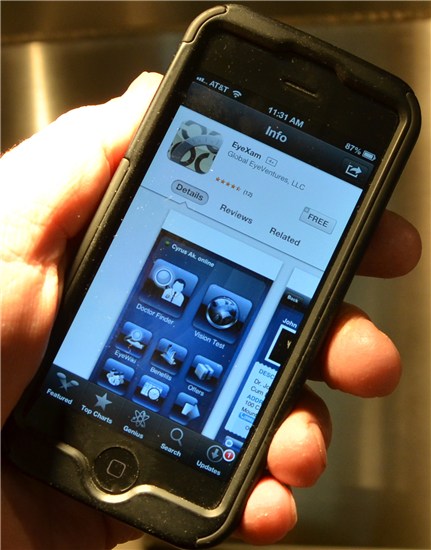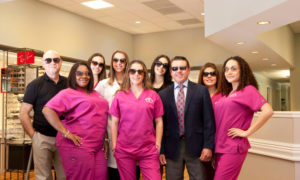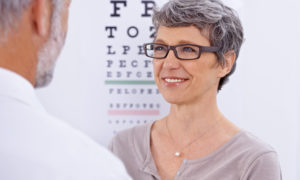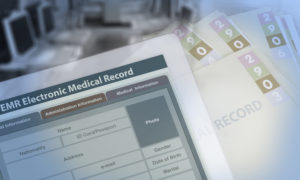By Steve Vargo, OD, MBA 
Mobile apps for health care information are popping up everywhere—and an OD can use them to get into the information exchange process. Here is your guide to the best apps to facilitate doctor-patient discussions on eye health.
When patients have questions about anything and everything–including healthcare–they increasinglyturn first to their mobile devices. It is likely many of these patients are already using apps as resources when they have a question about their eyes. Unfortunately, not all healthcare education is created equal. Here is my guide to recommending educational apps to your patients, including why you would even want to do so in the first place.
 Patients are Downloading Healthcare Apps in Droves
Patients are Downloading Healthcare Apps in Droves
According to Jupiter Research, 44 million medical and healthcare apps were downloaded in 2012. This number is expected to rise to 142 million in 2016. Whether or not you are recommending apps to your patients, many of them are already using them. However; the explosion of apps is way ahead of the tests to determine which ones actually do what they claim to do. By familiarizing yourself with some of the more reputable apps, you can help your patients make more informed decisions on which ones to choose, and also play a role in promoting healthy eyes.
The Best Apps Don’t Seek to Replace the Doctor
A recent survey found that 90 percent of patients would accept the offer of a mobile app, while only 66 percent of respondents would accept prescription medicine from their doctor (Digitas Health). Moreover, 89 percent of doctors were likely to recommend a mobile health app to patients (eClinicalWorks).
If a patient discovers a medical app on their own, they may be inclined to think they do not need to see their doctor if the app says everything is OK. Medical apps should be trustworthy, accurate and augment the care that your doctor provides, not replace it. For example, vision screening apps should serve as a reminder that patients need to schedule an appointment with an eyecare professional. Open discussion with your patients about the benefits and pitfalls of medical apps can help avoid an over-reliance on this technology.
Offer Info on Apps to Wide Swath of Patients
Doctors have become more comfortable using mobile devices and medical apps to access reference materials in and out of the exam room. Likewise, patients have become more comfortable using apps for their own healthcare needs. Common sense dictates that you would recommend apps to patients who are comfortable using mobile technology, such as smartphones and tablets. However; the generational lines are becoming rapidly blurred on mobile device usage. Smartphones have penetrated the market to the point where “dumb-phones” will likely be extinct in the next few years. Even the older, less tech-savvy demographics are becoming more comfortable with this technology.
It’s not uncommon to see patients (young and old) texting, checking e-mail or surfing the internet on their phone in the reception area. If you’re not certain, you could simply ask the patient if they have a smartphone. Since many medical conditions can affect both vision and ocular health, I assembled a brief list of free consumer apps that not only encourage healthy vision, but also a healthy lifestyle. In recommending these apps, you will likely make a positive impression when you show concern for your patient’s overall health, not just their eyes.
EyeXam: Patients can take a self-guided vision screening, locate an eyecare provider near them and make an appointment–directly from the app! One of the more interesting features is the ability to track macular disease progression. A digital Amsler Grid allows patients to indicate areas of scotoma or metamorphopsia by touching the screen. The results and history can be saved and e-mailed to their doctor. This app was developed by an optometrist with a breadth of knowledge in both eyecare and mobile technology. Click HERE to see a quick video demo of EyeXam’s features.
My Fitness Pal: Obese and overweight people are at greater risk for eye disease, including AMD and diabetic retinopathy. This mega-popular app helps people lose weight by keeping track of the food they eat and activity they do. Studies have confirmed that the more consistently you track these habits, the more likely you are to stick with a weight management program and succeed in your goals.
Nike+ Running App: One of my personal favorites. This app uses GPS technology to track your distance, pace, time and calories burned, giving you audio feedback as you run. You can also post your runs to Facebook and hear real-time cheers for each like or comment you receive.
Breathe2Relax: Anxiety can wreak havoc on the body, including the eyes. This app is a stress management tool that uses diaphragmatic breathing exercises to help with mood stabilization, anger control and anxiety management.
EyeDROPS: Non-compliance and failure to properly instill eyedrops is a common problem for patients requiring eye medications. Developed by a glaucoma specialist, this app reminds you to take your drops, keeps a record for you and warns you when you’re about to run out of the drops.
The FDA is working on regulations for medical apps. A few private companies are also taking on this task. Until there is greater regulation in this space, it may be wise to provide our patients with some guidance as many of them are increasingly using their mobile platforms as medical devices.
Resource
Click HERE for a related article featured on www.fiercemobilehealthcare.com on how family practitioners are using mobile apps to educate patients.
Related ROB Articles
QR Codes: Your Mobile Marketing Tool
Make Your Web Site Mobile-Friendly
Twitter: Social Media Tool for Get-to-the-Point Messaging
Steve Vargo, OD, MBA, is president of iMobile Communications in St. John, Ind., a company that specializes in mobile communication and marketing for doctors. He is also a consultant for the EyeXam mobile application. Dr. Vargo also is an associate with Vision Quest Eye Clinics, a private practice group in the Chicago suburbs. To contact him:svargo@iMobileCommunications.com.



























